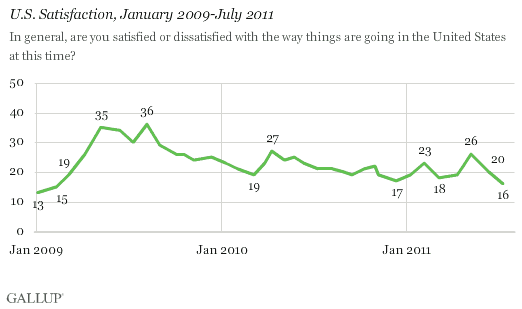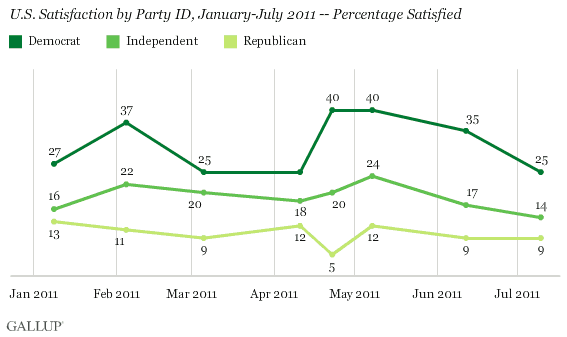PRINCETON, NJ -- Americans' satisfaction with the way things are going in the country fell to 16% in July, the lowest in more than two years. Satisfaction approached this level in December 2010, when it descended to 17%, but it has not registered as low as 16% since February 2009 -- President Barack Obama's first full month in office -- when it was 15%.

The new poll was conducted July 7-10 as Congress and Obama were engaged in heated negotiations over a bill to raise the nation's debt ceiling.
Satisfaction fell four percentage points just in the last month, from 20% in June. Among party groups, Democrats' satisfaction has dropped the most, from 35% to 25%. Independents' satisfaction in June and July was fairly steady at 17% and 14%, respectively, and Republicans' was unchanged at 9%.

Additionally, whites' satisfaction fell more sharply over the past month -- to 12% in July from 17% in June -- than nonwhites', to 26% from 29%.
Reason for Reduced Satisfaction Unclear
The recent slide in approval could partly signal a return to more "normal" levels of satisfaction after the surge in May following the killing of Osama bin Laden. However, rather than reverting to April's 22% level, satisfaction has descended even further.
Americans' economic confidence is unchanged thus far in July compared with June; therefore, the economy does not appear to be the reason for Americans' lower satisfaction with the country's direction.
Public approval of President Obama and Congress has also been fairly steady in June and July, albeit at relatively low levels for each.
Bottom Line
Fewer Americans are satisfied with the way things are going in the country today than were satisfied in June or in any month since February 2009. The recent month-to-month decline is seen particularly among Democrats, but is also evident among whites, broadly.
Americans' approval of Obama and of Congress, along with their economic confidence ratings, are all similar to where they stood in June, as well as prior to the bin Laden-related rally in April. Whether the dampened satisfaction this month is a temporary finding or the precursor for a possible decline in Gallup's political and economic indicators remains to be seen.
Survey Methods
Results for this Gallup poll are based on telephone interviews conducted July 7-10, 2011, on the Gallup Daily tracking survey, with a random sample of 1,016 adults, aged 18 and older, living in all 50 U.S. states and the District of Columbia.
For results based on the total sample of national adults, one can say with 95% confidence that the maximum margin of sampling error is ±4 percentage points.
Interviews are conducted with respondents on landline telephones and cellular phones, with interviews conducted in Spanish for respondents who are primarily Spanish-speaking. Each sample includes a minimum quota of 400 cell phone respondents and 600 landline respondents per 1,000 national adults, with additional minimum quotas among landline respondents for gender within region. Landline telephone numbers are chosen at random among listed telephone numbers. Cell phone numbers are selected using random-digit-dial methods. Landline respondents are chosen at random within each household on the basis of which member had the most recent birthday.
Samples are weighted by gender, age, race, Hispanic ethnicity, education, region, adults in the household, and phone status (cell phone only/landline only/both, cell phone mostly, and having an unlisted landline number). Demographic weighting targets are based on the March 2010 Current Population Survey figures for the aged 18 and older non-institutionalized population living in U.S. telephone households. All reported margins of sampling error include the computed design effects for weighting and sample design.
In addition to sampling error, question wording and practical difficulties in conducting surveys can introduce error or bias into the findings of public opinion polls.
View methodology, full question results, and trend data.
For more details on Gallup's polling methodology, visit www.gallup.com.
